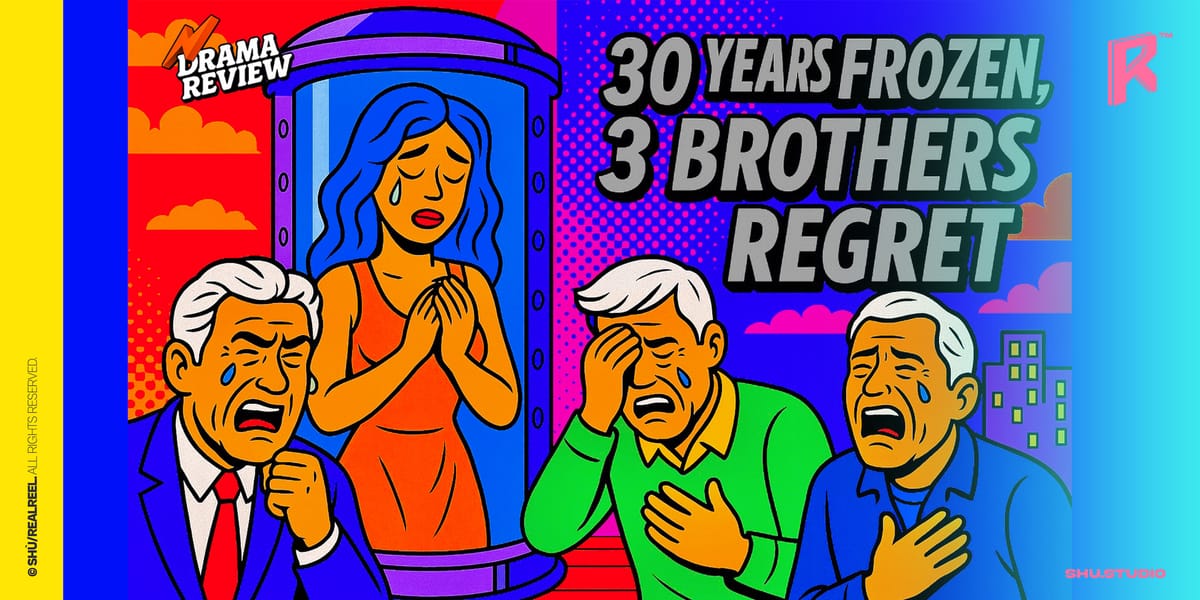Vertical Drama Review: 30 Years Frozen, 3 Brothers Regret

⚈ ⚈
When this Chinese vertical drama, produced by Shenyang Xinuo Information Technology, slipped onto DataEye’s domestic “heat list” at №28…
how raw emotion can outrun plot holes in the global Vertical…
Join Real ReelWhen this Chinese vertical drama, produced by Shenyang Xinuo Information Technology, slipped onto DataEye’s domestic “heat list” at №28 on April 7, few expected it to ignite an export-and-remake frenzy. Within weeks Reelshort, Netshort and several Apps rolled out the original overseas, while DramaWave shot Korean and U.S. remakes and Netshort, Stradust TV delivered a second U.S. cut, etc. Since mid-June all versions have streamed side-by-side, and for two straight months they’ve clung to DataEye’s international chart, proof that 2025’s assembly-line short-form model can still mint a breakout hit.

The set-up is pure melodrama: adopted sister SHE (different name in different shows, so SHE here) is cast aside when the “real daughter” returns, so she volunteers for a 30-year cryonics experiment. While SHE sleeps, her three birth brothers awaken to regret, but it’s too late, their hair already turned white. The narrative is anything but seamless; many scenes exist purely to spark another fight. Yet the vertical frame’s relentless close-ups, especially the lead actress’ cascade of crying jags, pin audiences in place. Even viewers who spot the logical gaps keep watching until the very end.

That dynamic is clearest in Asia. For decades Asian viewers have shown a higher tolerance for “dog-blood” twists and web-novel excess: if the emotional peaks soar and the characters suffer hard enough, clunky turns are forgiven. Coherence matters, but only after the show has delivered the tears and the “shipping” moments. Western audiences, by contrast, treat internal logic as table stakes; motives must track, cause and effect must line up. No surprise, then, that Reddit and IMDb are full of complaints about “AI-generated writing” and “conflict for conflict’s sake.”
But the vertical-drama market stretches far beyond North America and Western Europe. South American viewers embrace high-intensity family sagas, Southeast Asia’s short-video ecosystem lives on rapid-fire “爽点” (instant-gratification hooks), and African audiences respond to concise, straight-to-the-point storytelling. Platform algorithms amplify that universality: when a looping 30-second clip nails the pain of being replaced or the tragedy of sibling betrayal, users often tap “next episode” even while muttering about plot holes. Emotional resonance outweighs narrative rigor, and a tiny production suddenly looks like a global contender.
The producers doubled down on that insight instead of patching the script. The U.S. cut trims everyday family chatter so conflicts hit harder; the Korean version leans into mournful music and slow-motion; the Southeast Asian release pushes the cryonics experiment upfront to spotlight self-sacrifice. Each territory gets something simultaneously familiar and fresh, while the companies bank on raw sentiment to paper over thin logic.

From an industry angle, “3 Brothers Regret” shows that vertical dramas trade on emotional efficiency more than narrative craftsmanship. Asian leniency supplies fertile ground; Western skepticism reminds creators that long-term value still demands a sturdy story engine. True international success may lie not in ladling the same pot of feelings into new bowls, but in preserving the punch while gradually strengthening the causal chain, offering picky viewers a satisfying post-mortem.
In the high-speed 2025 short-drama pipeline, that balance is rare and valuable. Tears move us in the moment, but only a story that makes sense will stay in our heads when the next viral series drops.
★★★☆☆






